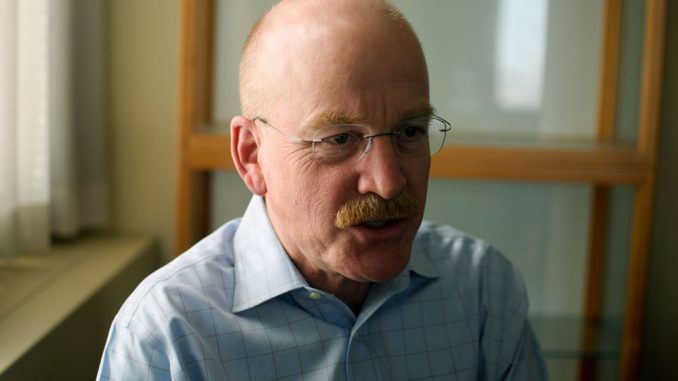
Former U.S. Congressman and current adjunct professor Joe Hoeffel was 54 years old and in office when he and his wife got arrested.
As a representative in Congress for Pennsylvania’s 13th district in 2004, Hoeffel participated in what he calls a “staged arrest” to spread awareness of the genocide occurring in the western province of Darfur in Sudan. He and a small group of protesters stood outside the Sudanese embassy and refused to move upon request from capitol police.
Hoeffel and his wife, Francesca, were arrested and fined $50. Francesca, usually not a political woman, agreed to get arrested with her husband after she couldn’t convince him not to participate in the protest in the first place.
“I said to my wife, ‘I’m going to do this,’” Hoeffel said. “She said, ‘Are you nuts?’ I said, ‘No, it’s a legitimate way to use whatever celebrity I have as a member of Congress to bring attention to the genocide in Darfur.’ And she said, ‘If you’re going to do it, I’m going to do it.’”
That’s one of many stories that Hoeffel sometimes tells in the classroom at Temple, where he talks about current events, encourages students to read the newspaper and promotes discussion by calling on people by name, even if they haven’t raised their hand.
Hoeffel, 62, teaches American State & Local Politics, a fitting course for a man who has practiced politics since the 1970s and has been elected at every level. He was in the U.S. House of Representatives from 1999-2005, was a state representative from 1977-84, and served on the Montgomery County Board of Commissioners from 1992-98 and again from 2008-2012.
To anyone that’s been in class with Hoeffel, it’s clear that his unusually enthusiastic approach to politics stems from an old-fashioned belief in the people’s power to better their lives through self-government.

“I’m a sucker for the political process,” Hoeffel said. “I have my frustrations, no doubt. I’ve had some disappointing experiences, both personally with people and policies. But I continue to believe in the political process and the necessity for people to get involved in it to try to improve the quality of life in their community.”
As a student volunteer, Hoeffel was a part of the George McGovern presidential ticket in 1972 that famously lost in a landslide to Richard Nixon at the beginning of the Watergate scandal. He was a member of Congress during 9/11 and voted to go to war in Afghanistan and Iraq.
The personal relationships Hoeffel has developed in his 30-year career in politics can be rattled off on an impressive string.
He knows Bill and Hillary Clinton personally, campaigned with John Kerry in 2004 and used to ride the train with Joe Biden.
In a memorable interaction with President George W. Bush early on in Bush’s first year in office, Hoeffel argued with the president on pre-9/11 strategy in Afghanistan aboard Air Force One.
“I remember saying to him that we need to focus on getting peacekeepers into that country to help them deal with their problems,” Hoeffel said. “And he pounded on the conference table and said, ‘We’re war fighters, not peacekeepers!’”
“It wasn’t an angry moment, but it was a forceful moment on his part,” Hoeffel added. “And I disagreed with him. I think we have to be both. We have to be strong militarily, but we have to be making peace.”
Hoeffel’s disagreements with President Bush, and his take on the administration’s mishandling of the Iraq War, will be the subject of a book Hoeffel started writing a few months ago to be titled “Iraq: Truth, Lies, and Consequences.”
The impetus behind his decision to write the book, Hoeffel said, is what he calls the “self-serving” autobiographies written by members of the Bush administration after they left office. Ironically, many of those books turn out to be read by students in Hoeffel’s class, which requires a final paper responding to a political autobiography of a student’s choice.
Hoeffel has been teaching at Temple for two and a half years after an unsuccessful bid in the 2010 gubernatorial election. He gave up his seat in the House in 2004 to run for a spot in the Senate, but lost to the late Arlen Specter.
Hoeffel graduated from the then-called Temple University School of Law in 1986 and has practiced law on and off for the past 25 years. He returned to Temple to teach, he said, to perpetuate a career-long appreciation for the classroom.
“When I was in office, I went to classrooms all the time, from kindergarten to college classes,” Hoeffel said. “I would accept every invitation to come and speak about politics or the political process. So when I had time on my hands, it was always something that I wanted to do.”
Last year, Hoeffel gave a TEDx talk at Arcadia University titled “You Gotta Bring It,” discussing creativity and passion in leadership. In the talk, Hoeffel quoted Daniel Hudson Burnham, an urban designer, who said, “Make no little plans. They have no magic to stir men’s blood.”
“It means think big,” Hoeffel said. “If you want to get people’s attention and stir their blood, it won’t happen with little plans. You have to plan big and talk big, and you better deliver.”
Hoeffel added one last bit about government before having to leave to teach a class: “There’s a lot of inertia in government. If left to its own devices, government won’t do a damn thing,” Hoeffel said. “You have to make things happen, and that’s the fun part.”
Joey Cranney can be reached at joseph.cranney@temple.edu or on Twitter @joey_cranney.


Be the first to comment